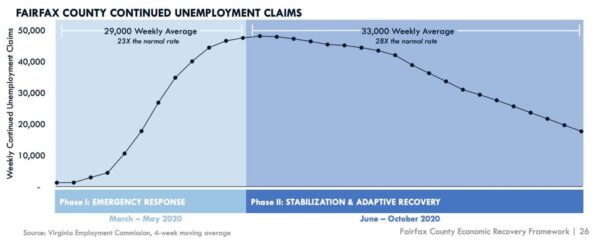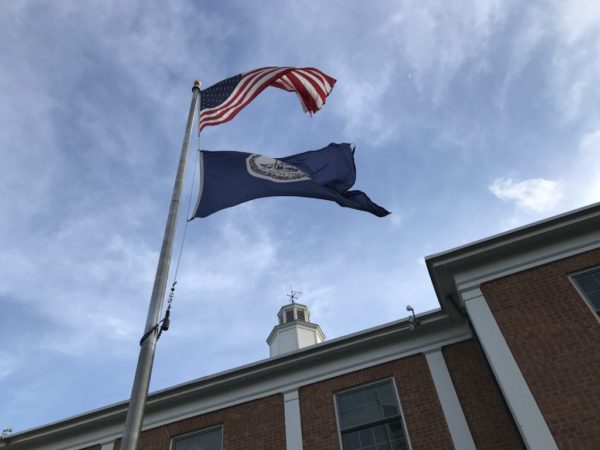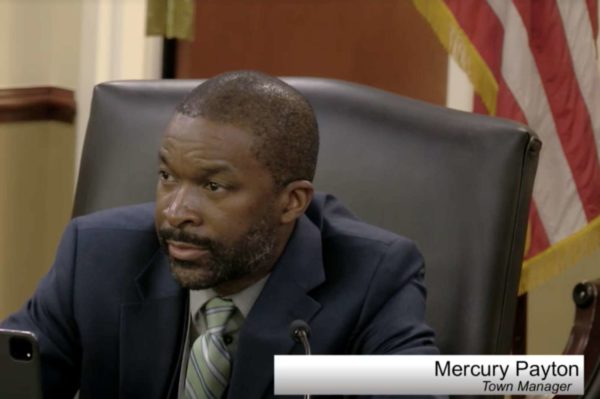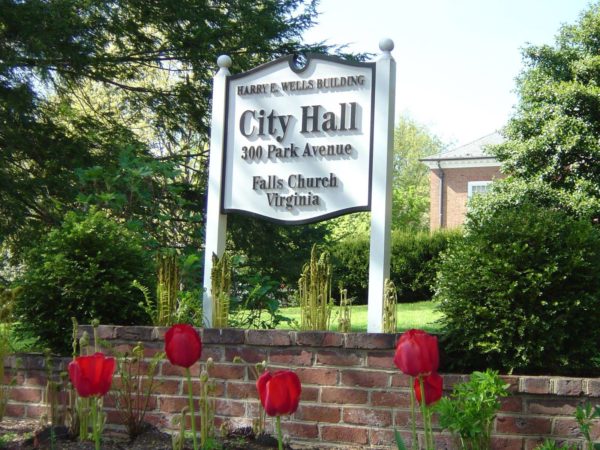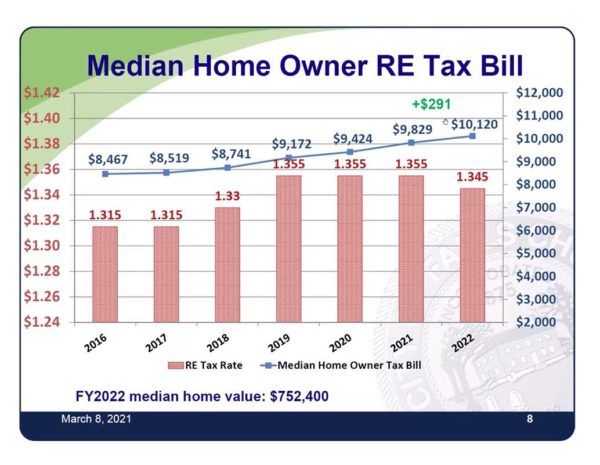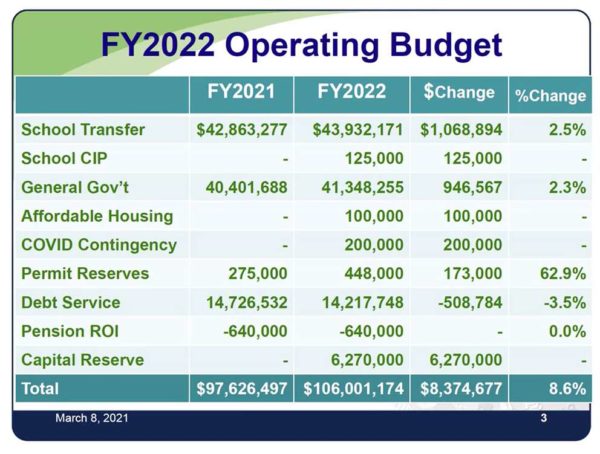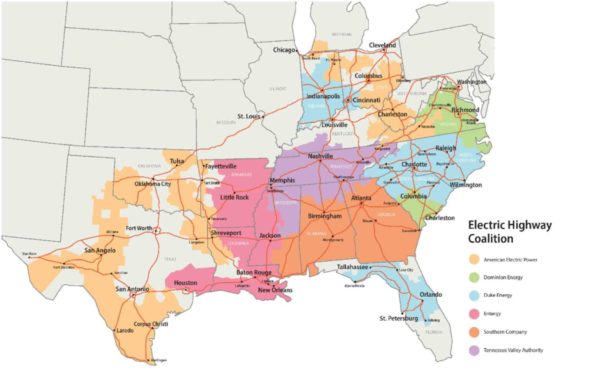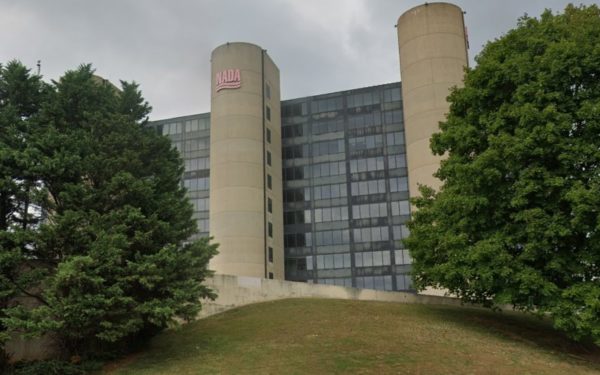A consultant is recommending a dozen ways Fairfax County can uplift people whose livelihoods have been harmed by the pandemic in the short-term and promote long-term economic resilience.
Specific short-term measures include launching “Buy Local” and “Made in Fairfax” campaigns, focusing on women- and minority-owned businesses, and finding ways to reduce rent or other costs for struggling small businesses.
Other recommendations target those hit hardest — including people without high school degrees, women with children, and people of color — with services like career centers, workforce training programs, and affordable childcare.
“A lot of these things have ongoing aspects, but tying them together and focusing on economic recovery is really going to be an effective approach,” Dranesville District Supervisor John Foust said.
County staff presented plans for implementing the consultant’s recommendations and assisting small businesses during the Fairfax County Board of Supervisors economic initiatives committee meeting on Tuesday (March 16).
Fairfax County has up to $15 million in reserves to support economic recovery efforts and could also use some of the anticipated $222.56 million in federal funds coming from the American Rescue Plan, according to Foust, who chairs the committee.
Hunter Mill District Supervisor Walter Alcorn called the staff proposal “fantastic” but added that transportation — which did not figure into staff planning — should play a role in the county’s recovery efforts.
“Since we’re doing something new, I would just recommend putting more structure into collaboration across agencies,” Providence Supervisor Dalia Palchik said.
Fairfax County hired the consultant HR&A last summer to analyze how the COVID-19 pandemic has affected its economy and what the county government could do to expedite a more just recovery. More than 65 organizations and small businesses participated in the study, providing input on perceived barriers to and strategies for economic recovery.
According to the consultant’s report, before COVID-19, flourishing technology and government sectors contributed to a decade of strong economic growth for Fairfax County. The total number of jobs grew by 9% annually, and employment had reached its lowest level since the Great Recession.
In 2018, the county had the third-highest median household income in the D.C. area, but significant racial disparities lurked just below the surface: The median household income for white residents was about $140,000, exceeding that of Black households (~$86,000) and Hispanic households (~$81,000).
The pandemic reversed that job growth and exacerbated the existing disparities.
Through December 2020, Fairfax County lost an estimated 48,200 jobs, mainly in food service, hospitality, retail, and the arts. Small businesses in these three sectors will have a particularly long road to recovery, HR&A said.
The consultant also reported that job losses were most acutely felt by low-income people, people of color, and people with lower levels of formal education and training, which will make “the road to economic stability longer and more challenging.” Read More
Falls Church City could be getting a second phase of the Founders Row development project on W. Broad and S. West streets.
Developer Mill Creek Residential Trust is proposing a mixed-use apartment building with 319 units, ground-floor retail, and underground parking with 80 retail and 351 residential spaces. It would replace the vacant Rite Aid and carpet store at 1001 and 1003 W. Broad Street across the street from the first phase of Founders Row.
“It’s meant to complement phase one in the evolving downtown of the City of Falls Church,” Mill Creek representative Joe Muffler said during a Falls Church City Council meeting on Monday (March 15).
Mill Creek submitted an application for Founders Row II to the city in November. The developer anticipates finishing the first phase by next March and hopes to start phase two around that time, Muffler said.
The developer is seeking special exceptions to allow a 30-foot height bonus, which would make the development to 85 feet tall, and to build residential units in a mixed-use area.
Aiming for LEED Gold status, Founders Row II will have electric vehicle charging stations in the parking lot and plan for future solar panel installations. The developer also plans to put utilities underground and has committed to making street and sidewalk repairs.
Mill Creek plans to re-time signals and add traffic calming measures at the intersection of S. West and W. Broad streets. The project is projected to produce a net 3-4% increase in cars at peak hours, Muffler said.
A Falls Church City staff analysis says nearly 40 units could be set aside as affordable, which is “in significant excess of the ‘typical’ 6% of all units at 60% AMI.” The proposed contribution includes 6% at 60% AMI and 6% at 80% AMI.
The affordable housing unit contribution compensates for a lack of cash contributions, but the developer is willing to be flexible, Muffler said.
The larger-scale contribution also compensates “for not providing net new commercial square feet,” Becky Witsman, the city’s economic development division chief, said in a letter.
58 units will be restricted to residents 55 and older, bringing the total number of proposed age-restricted units to 134 across both Founders Row developments, Muffler said.
“We wanted to bring a thoughtful, diverse mix that brings new renters into the city, that isn’t just kind of one size fits all,” he said.
On Monday, Councilmember Ross Litkenhous commended Mill Creek for adding green space to the proposed project in response to feedback two weeks ago. He said it will help with connectivity to the neighborhood and the Washington & Old Dominion Trail, which passes the site to the north.
In addition to housing, Founders Row II will have 15,000 square feet of retail, 5,000 square feet of medical or professional offices, and a 5,000 square-foot community co-working space. Muffler envisions less experiential, more necessary retail occupying this space.
“We all know Founders Row phase one has lifestyle- and entertainment-heavy retail,” he said. “One thing that is never going away and gets set aside for ‘sexier’ uses is retail such as convenience marts, pharmacies, and dry cleaners.”
The retail will be recessed to provide outdoor seating that will be appealing in light of the pandemic, Muffler said.
Councilmember Letty Hardi said there was “a lot to like” about Mill Creek’s proposal but cautioned that recessed retail with pavilions does not always work. She also suggested adding a turn lane onto S. West Street, as traffic can back up to Madison Lane.
“I know that this will be a consistent point of feedback, as users have trouble turning onto West right now,” Hardi said.
The Town of Vienna is leading the way in Virginia with a newly conceived celebration of four amendments to the U.S. Constitution that enshrined the rights of people of color and women.
The town announced on Friday (March 12) that planning for the inaugural Liberty Amendments Month celebration is officially underway, and community organizations, businesses and individuals are encouraged to help shape the four weeks of festivities.
Liberty Amendments Month is the brainchild of Vienna Town Manager Mercury Payton, and the Vienna Town Council adopted a resolution on Dec. 7 to officially recognize the occasion. It has since been ratified by the Virginia General Assembly as well.
“We all can celebrate these amendments that ensure rights and liberties for each of us,” Payton said.
Patrons of the now-passed bill included Del. Mark Keam (D-Vienna) and state Sen. Mamie Locke (D-Hampton), who was one of Payton’s professors at Hampton University, Inside NOVA reports.
“I’m so proud that the Town of Vienna is leading the way in initiating this holiday and month-long commemoration of these fundamental rights that we all cherish,” Mayor Linda Colbert said. “I’m especially proud that Town Manager Mercury Payton came up with the idea and has worked hard to see it become a reality.”
In the wake of last summer’s racial justice protests, Payton conceived of Liberty Amendments Month as a celebration of the 13th, 14th, 15th, and 19th Constitutional amendments, which abolished slavery, granted citizenship to anyone born or naturalized in the U.S., and extended voting rights to all citizens regardless of race and gender.
Liberty Amendments Month will begin on June 19 — also known as Juneteenth — with an educational event that will “offer a thoughtful reflection on the liberties assured by these four amendments to the U.S. Constitution,” according to the town.
Each of the next four weeks will be dedicated to one of the four liberty amendments with contests, lectures, classes, themed restaurant specials, walks, art exhibits, films, and performances.
The celebration will culminate on July 19 with a multicultural festival featuring food, drinks, crafts, and entertainment from around the world. The Vienna Town Council has designated that day as Liberty Amendments Day, replacing Columbus Day on its list of official holidays.
“There’s lots to celebrate here,” Councilmember Chuck Anderson said. “This is going to be a people’s event just as the Constitution is the people’s document.”
Groups interested in sponsoring, participating in, or hosting events can apply online by April 1.
The town is advising planners to accommodate COVID-19 restrictions and social-distancing guidelines, which could still be in place this summer.
Planning meetings will be held at 5 p.m. on the fourth Tuesday of each month. Interested organizations can contact [email protected] for a Zoom link to the meetings or more details.
Photo via Town of Vienna
Some big changes are coming to McLean, and Dranesville Supervisor John Foust says he supports many — but not all — of them.
During a “Good Morning, McLean” breakfast hosted by the Greater McLean Chamber of Commerce yesterday morning (Thursday), Foust highlighted ongoing redevelopment work to the downtown area and Chain Bridge Road, but expressed caution about proposed zoning changes.
He repeated his support for the McLean Commercial Business Center revitalization plan despite some vocal opposition, saying it encourages development while protecting those who do not want McLean to become the next Tysons. The Fairfax County Planning Commission will hold a public hearing on the plan on April 28, and it will go before the Board of Supervisors on May 18.
Foust also spoke favorably about Tri-State Development’s proposal to build a 35-unit senior living facility with townhouses on a Chain Bridge Road site that would otherwise fit nine single-family homes. Earlier this month, the planning commission deferred a decision on the plan until next Wednesday (March 17).
“It’s exactly what McLean residents are looking for who want to downsize but don’t want to leave McLean,” Foust said. “Fundamentally, it’s a good application, and I think it’ll probably get approved.”
The project has received some pushback from nearby residents who say the project extends the business district into their residential area and will cause transportation and parking problems.
Foust acknowledged these complaints, adding that a dedicated left turn lane at the Chain Bridge and Davidson Road intersection could be needed to account for car and foot traffic. Ultimately, though, he believes it is better than the alternative for developers.
“Building nine houses would’ve been miserable,” he said.
McLean is also bracing for the potential impact of Fairfax County’s Zoning Ordinance Modernization project. Most of the changes proposed by county staff are “non-controversial” and will simplify frustrating ordinances, Foust said.
But he opposes a few elements that have also consternated the public, including proposed regulations on flags and changes to the permits required to operate a business from home.
Foust says loosening customer and signage rules for home-based businesses could lead to more businesses in residential areas.
“Staff prepared, I think, a very liberalized version,” he said. “I’m not excited about the direction staff is trying to take this.”
Outside of development and zoning issues, Foust says that, as chair of the Board of Supervisors’ economic initiatives committee, he has been focused on how Fairfax County will recover from the COVID-19 pandemic once it’s over.
The committee will receive a presentation on Tuesday from a consultant that the county hired last year to develop recommendations for its road to recovery. Right now, about $15 million are earmarked for implementing recovery programs, but Foust predicts “that number will increase dramatically” when Fairfax County receives federal funding through the American Rescue Plan Act.
According to Fairfax County, that sum could be $222.56 million, although the exact amount has not yet been confirmed by the federal government.
In the meantime, the vaccine process is picking up, even with more than 103,000 people currently on Fairfax County’s waitlist.
“We’re getting through it,” Foust said. “…I get so frustrated sometimes with the failures we’ve encountered, the bumps in the road, but when I step back and look at what staff and others are accomplishing, it’s just amazing.”
Staff photo by Jay Westcott
The City of Falls Church’s plan to reopen school buildings remains on track, and some students could be learning in-person full-time after spring break, which runs from March 29 to April 2.
Like their Fairfax County peers, Falls Church City Public Schools students currently have the option of going into school twice a week or taking all-virtual classes. Students getting special education services and children in the Virginia Preschool Initiative are in-person four days a week.
“It’s been quite a couple of weeks,” FCCPS Superintendent Peter Noonan said during a school board meeting Tuesday night (March 9).
Unlike Fairfax County, though, Falls Church has announced plans to potentially let some students attend in-person classes five days a week in the near future.
Staff at Jessie Thackrey Preschool and Thomas Jefferson and Mount Daniel elementary schools have started planning for a return to full-time, in-person instruction on April 6. Classes will be led by teaching staff members who have been fully vaccinated.
FCCPS spokesman John Wesley Brett said, on that day, both elementary schools will return to the “pre-pandemic” schedule of 8:50 a.m. to 3:50 p.m., including the usual early release at 1:15 p.m. on Wednesdays.
“Each school will implement mitigation procedures and work to ensure that continuity of instruction is provided,” he said. “Parents may opt to have their child remain in a virtual model and have until March 15 to make their choice known.”
FCCPS also hopes to eventually expand full-time, in-person learning to secondary students, but planning is more complex, Noonan said.
FCCPS is also in the process of reviewing new guidance on school reopenings that the Virginia Department of Health and Virginia Department of Education released on Tuesday.
“There is a growing chorus from VDH and VDOE to get our students back in school sooner rather than later,” he said. “That’s something I think we can all agree with, and it’s something we all want.”
The VDOE advises schools to weigh the risks of not opening schools over concerns that 100% of COVID-19 risks cannot be mitigated.
“Long-term school closures as a mitigation strategy for COVID-19 transmission may cause inadvertent harm to children,” the guidance said. “For example, children who do not have in-person instruction may suffer learning loss with long-term effects, mental health issues, or a regression in social skills.”
FCCPS could move forward more quickly if it follows the lead of other school systems across the nation that have reduced social distancing requirements from six feet to three feet, argues Courtney Mooney, a parent who has been advocating for five days a week of in-person instruction as part of the group Falls Church City Parents for Schools.
Mooney noted that the six-feet rule is not universally agreed upon by scientists and health experts. For instance, the World Health Organization recommends physical distancing of at least one meter — or three feet — after a study it funded found that would be sufficient to significantly reduce the risk of infection by the novel coronavirus.
“I think Superintendent Noonan wants our kids to be back,” Mooney said. “FCCPS needs to continue actively engaging parents and providing the level of detail they’ve provided the last two weeks.”
She credited FCCPS for responding to what she described as mounting frustration and declining trust among parents. As more details are released, parents are trusting the planning process more, she said.
Noonan has also incorporated parents, teachers, staff and community representatives into a newly formed Reopening Advisory Group that met for the first time this week, Mooney said.
Following in the footsteps of his Fairfax County counterpart, Falls Church City Manager Wyatt Shields is proposing a one-cent reduction in the real estate tax rate as part of the city’s advertised fiscal year 2022 budget.
However, because of rising assessed values, the average homeowner will still experience a $291 increase in their tax bill next year.
Presented to the city council on Monday (March 8), the advertised budget increases city government operating expenses by 2.3% (or $946,567) and public schools funding by 2.5% (or just over $1 million).
“With vaccines rolling out, and springtime in the air, we need to maintain vigilance but certainly have optimism toward the future — and hopefully, this budget reflects that as well,” Shields said.
Falls Church City School Board Chair Shannon Litton called the proposed $1 million funding increase for FCCPS “a bit better than we expected, given COVID-19.” The school division will also be receiving an additional $20,000 from the state and $31,000 from the federal government, she said.
Shields said the budget keeps revenues in line with forecasts from December without proposing a larger increase on residential real estate taxpayers. The city saw year-over-year increases in taxes on groceries and online sales, but a large decrease in revenue from hospitality taxes.
Highlights of the budget include funding for:
- $145,000 for body-worn cameras and civilian positions to support the department, which is a first step in addressing recommendations from the Use of Force Review Committee
- $200,000 in coronavirus contingency funds to address uncertainties, either revenue shortfalls or increased demand for services and assistance
- $150,000 to develop a Parks Master Plan
- $100,000 for the Affordable Housing Fund to supplement the $3.75 million Amazon REACH grant funds and leverage future developer contributions.
Shields has also proposed increasing stormwater management rates by 2%, or $4, for a median homeowner to pay for projects intended to address smaller-scale nuisance flooding. He anticipates that the city will need to increase rates by 10 to 15% for the next five years to fund six larger-scale stormwater management projects.
The advertised budget gives Falls Church City employees a 3% merit compensation increase, and a 3.5% step increase to uniformed police staff, but Shields told the city council on Monday that this small-scale growth is not sustainable in the long-term.
“My budget guidance for six years in a row was to keep non-personnel expenses flat,” he said. “So, it is really important to emphasize that after six years in a row of doing that — in addition to cuts made last year due to COVID-19 — our budgets are extremely lean.”
The city has about $3.94 million in unfunded needs across all departments, he said. These range from adding positions, including police officers, IT staff, and economic development staff, to maintaining public amenities, such as basketball and tennis courts and athletic fields.
Other highlights include:
- A $500,000 decrease in debt service, as due to the cancellation of planned debt issuance during the current fiscal year and refunding prior bonds from 2013 and 2011 at lower interest rates.
- A $4.5 million transfer from the 10-acre land at the George Mason High School campus to capital reserves.
- Anticipated concessions from Founders Row for $1.8 million, which will also be placed in capital reserves.
In addition to flood mitigation, other public safety spending includes investments in sidewalks, paving — which Shields said has been underfunded since the Great Recession — and neighborhood traffic calming activities. State grants will pay for improvements to the Park Avenue “Great Streets” project, the Oak Street Bridge and the Washington and Columbia intersection.
The city will also receive funding through the Biden administration’s American Recovery Act.
“That congressional aid [is] needed and necessary, and we will use it very well for infrastructure and capital needs,” Shields said.
Community members will get a chance to learn about the budget and share their comments at a town hall from noon to 1:30 p.m. on Thursday (March 11). Budget meetings will be held on March 22 and April 12, and there will be a second town hall on April 15 before the city council is slated to adopt the budget on April 26.
Photo via City of Falls Church Government/Facebook, charts via City of Falls Church
Dominion Energy plans to have new electric vehicle charging stations up and running in Northern Virginia this year, joining five other utility providers to create an interstate charging network that could extend from D.C. to western Texas.
The provider announced last week that it is partnering with American Electric Power, Duke Energy, Entergy Corporation, Southern Co., and the Tennessee Valley Authority to form the Electric Highway Coalition, which will provide electric vehicle charging infrastructure along major highways within their service territories.
About 18 million EVs could be on U.S. roads by 2030, according to estimates from The Edison Electric Institute. But while charging options becoming more plentiful to support everyday travel, anxiety remains among drivers about how to tackle long-distance road trips.
Dominion wants to enable electric long-distance travel for customers and its company fleet on major interstates and other well-traveled roadways, spokesperson Peggy Fox said. The charging stations will be capable of getting drivers back on the road in approximately 20-30 minutes.
“For example, in Virginia, we want to enable EV drivers to travel from the mountains to the beach or from the nation’s capital to the Virginia coast,” she said.
New stations in Fairfax County could be along I-66, I-95 and 495, and other well-traveled roads, she added. The stations will be about 100 miles apart or less, but exact locations and a concrete timeline have yet to be established.
“The partner utilities have started discussions to collaborate on site locations, site partners, design, and equipment,” Fox said.
Dominion will be coordinating with the other utility partners to provide sufficient charging capacity while using existing infrastructure and avoiding duplication, she said. The utility company plans to have a minimum of two charging stations at each location.
It has also been working with the state and locally with Fairfax County government to electrify transit. It rolled out electric school buses in January, and in October, it debuted a self-driving shuttle that runs between Dunn Loring Metro Station and Mosaic District.
Del. Mark Keam (D-35th), who represents part of Tysons and has supported many environment-focused bills, said he welcomes Dominion’s new partnership as a “good news story,” but the General Assembly approved a number of bills in its recent legislative session to indicate the state government is serious about electrifying transit, too.
“No company is going to go do things on their own, without knowing what the state will do as a partner,” Keam said. “Us providing that level of priority allows Dominion to say, ‘OK, here’s what we will do.'”
Virginia will join a dozen other states that have adopted clean car standards requiring low- and zero-emission vehicles to be available, he said. It will also be providing a “small but still meaningful rebate” for those looking to buy one.
Keam says Dominion’s plans could work in tandem with approved bills supporting the expansion of charging infrastructure. Legislators also requested a statewide study of transit equity, and Keam successfully introduced a bill to establish a state electric school bus fund.
“We’ve really put Virginia on the map,” he said.
Still, Keam added that Dominion’s role in electrifying transit should be an ongoing discussion. It owns substantial infrastructure and supplies much of Virginia’s power, so the utility needs to be included, but state lawmakers have been unable to agree on a regulatory approach.
“We have to look at all of this with clear eyes,” he said.
Image via Dominion Energy
The Safeway grocery store on Chain Bridge Road in McLean will soon be no more.
Tysons Reporter received several tips from readers about the impending closure after “going out of business” signs advertising sales popped up last week at the Safeway located at 1330 Chain Bridge Road.
A Safeway spokeswoman confirmed that the store is expected to close on April 30.
This is the only store that Safeway is closing in its mid-Atlantic division, which includes Virginia, D.C., Maryland, and Delaware, says Safeway Mid-Atlantic spokesperson Beth Goldberg.
“Closing a store is always a tough decision, but we sometimes have to make those decisions so we can invest appropriately in other areas of our business,” she said. “Like all retailers, we are constantly evaluating our store portfolio and look at every angle of the business. This includes our real estate.”
The parent company, Albertsons, will still have 111 Safeway stores in the D.C. area after this one closes, she said.
“We have no immediate plans to close any other locations,” she said.
A Lidl will be taking its place.
DMV-area retail-only real estate brokerage firm H&R Retail, which owns the Safeway property on Chain Bridge Road, now lists the German supermarket chain as a tenant. The chain, which is expanding its footprint in Northern Virginia, is known for its low prices.
Lidl spokesperson Chandler Ebeier confirmed to Tysons Reporter that the grocery retailer “will be opening a store in this location in the future, but it is too early to offer specifics at this time.”
“We look forward to serving the community in the future,” he said.
Inundated with messages from staff and community members on proposed changes to the 2021-22 calendar, Fairfax County School Board members directed Superintendent Scott Brabrand to redraft it.
During a work session on Tuesday (Mar. 2), the board told staff to consider ways to add flexibility through floating holidays. They said the calendar should take into account legal considerations, instruction, student wellness and pay for support staff, as well as survey preferences, absenteeism data, transparency and equity.
The school board will vote on a final calendar on Mar. 18.
FCPS announced last June that the school board will consider two ways to add in four religious holidays: Rosh Hashanah (Sept. 7, 2021), Yom Kippur (Sept. 16, 2021), Diwali (Nov. 4, 2021), and Eid al Fitr (May 3, 2022).
FCPS drafted a third proposal without those holidays in February, as some board members expressed reservations about the potential disruptions they would create.
“Support staff have been very vocal in terms of what the impact on their work will be,” School Board Chair Ricardy Anderson, who represents the Mason District, said on Tuesday. “I’m very mindful of what this means for our families who rely on schools for breakfast and lunch. We also know that we’re coming out of the pandemic, and we have had a lot of impact in terms of continuity of learning.”
Anderson reported receiving 269 messages from support staff, estimating at least 100 more. Member-at-large Karen Keys-Gamarra also said she received more than 700 written responses on the calendar.
Meanwhile, 286 students have signed a petition, and 76 clergy and faith organizations have signed a letter initiated by the Jewish Community Relations Council of Greater Washington (JCRC) urging the board to add the holidays.
Responding to the news that FCPS would be developing a new calendar, the Pozez Jewish Community Center of Northern Virginia said in a statement that it was heartened to see the board reject the calendar that did not include the new holidays.
“We are optimistic that the next option proposed will be one that is forward-thinking — acknowledging and respecting the cultural and religious diversity of the staff and students of faith in the county, as well as the community at large,” Pozez JCC Executive Director Jeff Dannick and President Susan Kristol said.
Member organizations of a Religious Observances Task Force, which FCPS formed to advise the school system on supporting religious minorities, had “strenuously” objected to the third calendar draft, saying its proposal lacked transparency.
“Given where the community has been at, where the process is so far, what data has revealed, it goes without saying that we need to give this a deliberate look,” member-at-large Abrar Omeish said. Read More
(Updated at 12:35 p.m.) The Meridian Group is following up its mixed-use development, The Boro, with plans for an expansion along Westpark Drive.
Fairfax County recently accepted a rezoning application from Meridian that involves about 9.37 acres of land in the west quadrant of Westpark Drive and Greensboro Drive, the developer’s legal representative Elizabeth D. Baker told Tysons Reporter.
The application concerns two buildings in a larger conceptual development plan that calls for four buildings — Buildings I, J, K and L — that will be developed with residential, continuing care, health club, and retail and service uses, she said in an email.
“This development will be an extension of The Boro, which is a successful transit-oriented mixed-use development across Westpark Drive,” said Baker, who is the Senior Land Use Planner for Walsh, Colucci, Lubeley & Walsh.
Fairfax County accepted plans for Buildings I and K on Feb. 25. It has also accepted and is evaluating a plan for a proposed continuing care facility in Building J by Silverstone Tysons.
Meridian is proposing the following specifications for Building I, which would be adjacent to Westpark Drive:
- Maximum of 200,000 square feet — up to 175,000 square feet for residential use and up to 25,000 for retail
- Maximum of 130 dwelling units, likely condominiums
- Approximately seven stories with a maximum height of 90 feet
- Underground and above-ground parking structures
“In addition to interior residential amenities, Building I includes an elevated outdoor terrace that looks out onto a central park,” Baker said.
Building K would be located west of Building I with frontages on Greensboro Drive. It has the following proposed specifications:
- Up to 430 residential units
- Up to 20,000 square feet of neighborhood-serving retail use
- Approximately seven stories with a maximum height of 90 feet
- Underground and above-ground parking structures
“Two interior courtyards providing amenities for the buildings’ residents are located atop the parking garage podium,” Baker said.
In addition to a central park, Meridian envisions creating a linear park along Westpark Drive. It would be a combined pedestrian and bicycle circuit designed to accommodate leisure bikers and walkers, according to Baker.
“Known as the Community Circuit, this park will include marked pavement, wayfinding signage, bike and pedestrian amenities, and focal elements such as public art, benches, and specialty landscaping,” she said.
The Meridian Group acquired the National Automobile Dealers Association headquarters building at 8400 Westpark Drive and an adjacent site in 2018, the Washington Business Journal reported. The developer paid $33.7 million to the NADA, which relocated to 8484 Westpark Drive that October.
A separate development is in the works at nearby Westpark Plaza.
The lot at 8401 Westpark Drive will be converted into an interim public “reading park” with new vehicle storage after the Fairfax County Planning Commission granted developer Dittmar’s request to amend its plans on Dec. 9. The amenities will occupy the site until Dittmar kicks off its idling plans for two residential buildings, a new hotel, and retail.
Image via Google Maps



